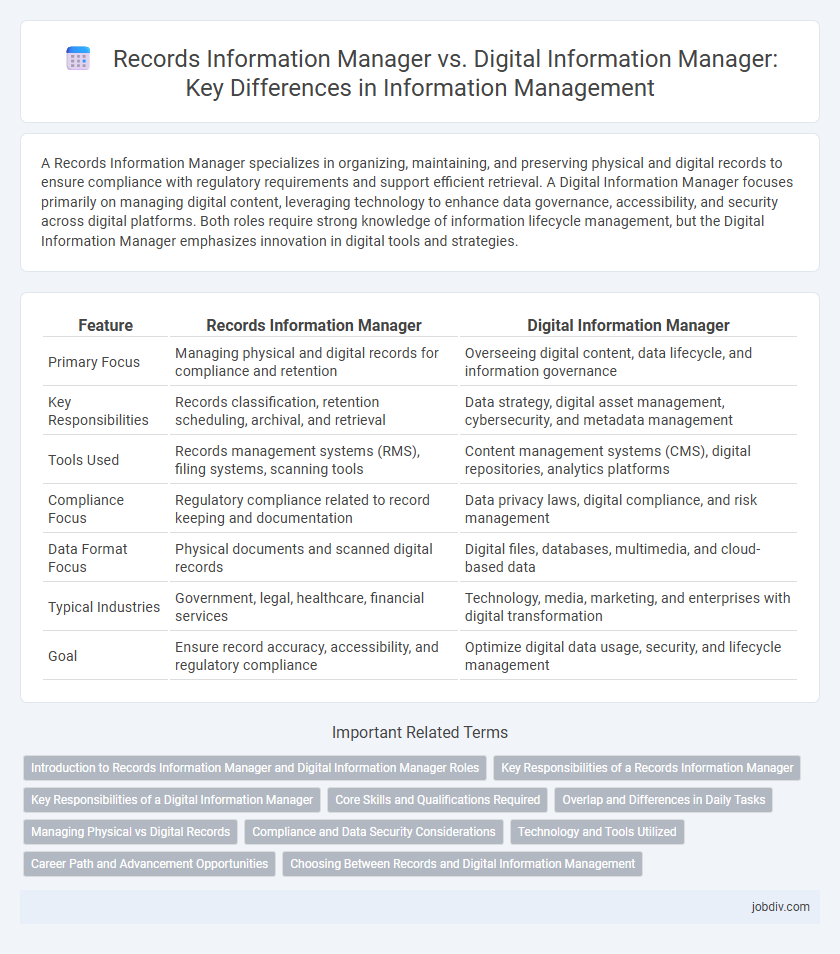A Records Information Manager specializes in organizing, maintaining, and preserving physical and digital records to ensure compliance with regulatory requirements and support efficient retrieval. A Digital Information Manager focuses primarily on managing digital content, leveraging technology to enhance data governance, accessibility, and security across digital platforms. Both roles require strong knowledge of information lifecycle management, but the Digital Information Manager emphasizes innovation in digital tools and strategies.
Table of Comparison
| Feature | Records Information Manager | Digital Information Manager |
|---|---|---|
| Primary Focus | Managing physical and digital records for compliance and retention | Overseeing digital content, data lifecycle, and information governance |
| Key Responsibilities | Records classification, retention scheduling, archival, and retrieval | Data strategy, digital asset management, cybersecurity, and metadata management |
| Tools Used | Records management systems (RMS), filing systems, scanning tools | Content management systems (CMS), digital repositories, analytics platforms |
| Compliance Focus | Regulatory compliance related to record keeping and documentation | Data privacy laws, digital compliance, and risk management |
| Data Format Focus | Physical documents and scanned digital records | Digital files, databases, multimedia, and cloud-based data |
| Typical Industries | Government, legal, healthcare, financial services | Technology, media, marketing, and enterprises with digital transformation |
| Goal | Ensure record accuracy, accessibility, and regulatory compliance | Optimize digital data usage, security, and lifecycle management |
Introduction to Records Information Manager and Digital Information Manager Roles
Records Information Managers specialize in organizing, maintaining, and securing physical and electronic records to ensure compliance with regulatory requirements and efficient retrieval. Digital Information Managers focus on managing digital assets, implementing data governance policies, and leveraging technology to optimize information lifecycle and accessibility. Both roles require expertise in information management systems, but Digital Information Managers emphasize digital transformation strategies and cybersecurity measures.
Key Responsibilities of a Records Information Manager
A Records Information Manager is responsible for developing and implementing effective records management systems, ensuring compliance with legal and regulatory requirements, and maintaining the integrity and security of physical and digital records throughout their lifecycle. They oversee classification, retention, and disposition schedules while coordinating audits and training programs related to information governance. Their focus is on managing tangible records and metadata to support organizational accountability and operational efficiency.
Key Responsibilities of a Digital Information Manager
A Digital Information Manager oversees the organization, storage, and security of digital data, ensuring compliance with data protection regulations and facilitating easy access to digital assets. Key responsibilities include managing digital content lifecycle, implementing data governance policies, and optimizing information retrieval systems. They collaborate with IT departments to deploy digital tools that enhance data management and support organizational decision-making.
Core Skills and Qualifications Required
Records Information Managers require expertise in physical and digital records management, compliance with legal regulations, and proficiency in metadata standards and archival practices. Digital Information Managers emphasize skills in data governance, digital asset management, and advanced knowledge of information systems, cloud technologies, and cybersecurity principles. Both roles demand strong organizational abilities, attention to detail, and proficiency in information lifecycle management and reporting.
Overlap and Differences in Daily Tasks
Records Information Managers focus on organizing, maintaining, and securing physical and digital records to ensure compliance with legal and regulatory requirements. Digital Information Managers primarily handle digital content creation, storage, and lifecycle management, emphasizing metadata, digital asset management, and technology integration. Both roles involve data governance and information accessibility but differ in media scope and technological tools used daily.
Managing Physical vs Digital Records
Records Information Managers specialize in organizing, maintaining, and securing physical records, ensuring compliance with retention schedules and proper storage conditions. Digital Information Managers focus on managing electronic records through digital platforms, utilizing metadata, access controls, and cloud storage solutions. Both roles require expertise in information governance, but Records Information Managers handle tangible documents while Digital Information Managers oversee virtual data environments.
Compliance and Data Security Considerations
Records Information Managers prioritize regulatory compliance by ensuring physical and electronic records meet legal retention and privacy standards, implementing strict access controls and audit trails to safeguard sensitive data. Digital Information Managers focus on securing digital assets through advanced encryption, data loss prevention technologies, and continuous monitoring to address cybersecurity threats and maintain compliance with data protection laws such as GDPR and HIPAA. Both roles require a comprehensive risk management strategy to protect information integrity and support organizational governance frameworks.
Technology and Tools Utilized
Records Information Managers primarily utilize document management systems (DMS) and archival software focused on physical and digital record-keeping, ensuring compliance with regulatory standards. Digital Information Managers leverage advanced cloud-based platforms, artificial intelligence (AI) for automated metadata tagging, and blockchain technology to enhance data security and accessibility. Both roles employ analytics tools but Digital Information Managers prioritize integration with emerging digital ecosystems and real-time data processing.
Career Path and Advancement Opportunities
Records Information Managers specialize in organizing, maintaining, and securing physical and digital records, often advancing into roles like Compliance Officer or Records Director with expertise in regulatory frameworks and records lifecycle management. Digital Information Managers focus on managing digital assets, leveraging technologies such as cloud storage, data analytics, and digital workflows, progressing toward positions like Digital Transformation Lead or Chief Data Officer. Career advancement in both fields depends on gaining proficiency in information governance, data privacy, and technological tools, with Digital Information Managers typically experiencing faster promotion due to increased demand for digital expertise.
Choosing Between Records and Digital Information Management
Choosing between a Records Information Manager and a Digital Information Manager depends on the organization's data format, compliance requirements, and technology infrastructure. Records Information Managers specialize in managing physical and electronic records to ensure regulatory compliance and efficient retrieval, while Digital Information Managers focus on optimizing digital assets using advanced software systems and cloud technologies. Understanding the scale of digital transformation and data governance needs helps determine the best fit for effective information management.
Records Information Manager vs Digital Information Manager Infographic

 jobdiv.com
jobdiv.com